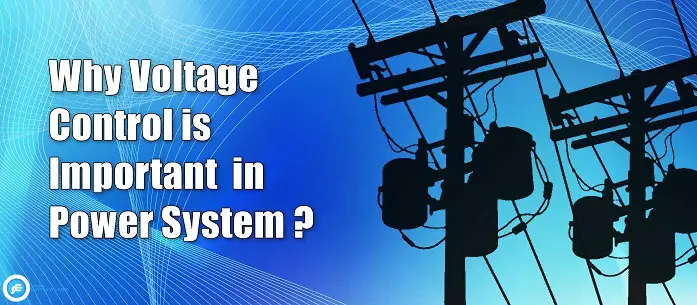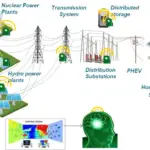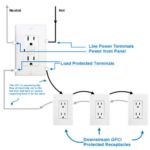
In a modern power system, electrical energy from the generating station is delivered to the ultimate consumers through a network of transmission and distribution. For satisfactory operation of motors, lamps and other loads, it is desirable that consumers are supplied with substantially constant voltage. Too wide variations of voltage may cause erratic operation or even malfunctioning of consumer’s appliances. Thus voltage control is an important issue in the power system.
To safeguard the interest of the consumers, the government in each country has enacted a law in this regard. The statutory limit of voltage variation is 6% of the declared voltage at consumer’s terminals.
Causes of Voltage Variation
The principal cause of voltage variation at consumer’s premises is the change in load on the supply system.
When the load on the system increases, the voltage at the consumer’s terminals falls due to the increased voltage drop in
(i) alternator synchronous impedance
(ii) transmission line
(iii) transformer impedance
(iv) feeders and
(v) distributors.
The reverse would happen should the load on the system decrease. These voltage variations are undesirable and must be kept within the prescribed limits (i.e. i 6% of the declared voltage).
This is achieved by installing voltage regulating equipment at suitable places in the power system.
Importance of Voltage Control
When the load on the supply system changes, the voltage at the consumer’s terminals also changes.
The variations of voltage at the consumer’s terminals are undesirable and must be kept within prescribed limits for the following reasons:
- In case of lighting load, the lamp characteristics are very sensitive to changes of voltage. For instance, if the supply voltage to an incandescent lamp decreases by 6% of rated value, then illuminating power may decrease by 20%. On the other hand, if the supply voltage is 6% above the rated value, the life of the lamp may be reduced by 50% due to rapid deterioration of the filament.
- In case of power load consisting of induction motors, the voltage variations may cause erratic operation. If the supply voltage is above the normal, the motor may operate with a saturated magnetic circuit, with consequent large magnetizing current, heating and low power factor. On the other hand, if the voltage is too lov, it will reduce the starting torque of the motor considerably.
- Too wide variations of voltage cause excessive heating of distribution transformers. This may reduce their ratings to a considerable extent.
It is clear from the above discussion that voltage variations in a power system must be kept to minimum level in order to deliver good service to the consumers.
With the trend towards larger and larger interconnected system, it has become necessary to employ appropriate methods of voltage control.








well said but voltage control is also important as any appliances have a limit to tolorate a excess of power it can resist up to a certain limit if that limit exceed then it will harm your appliances .